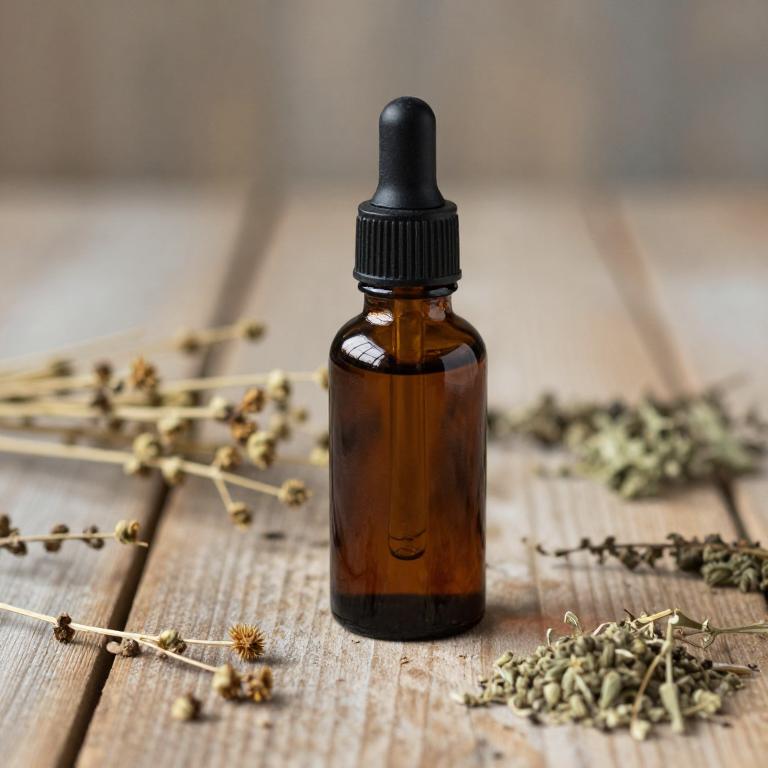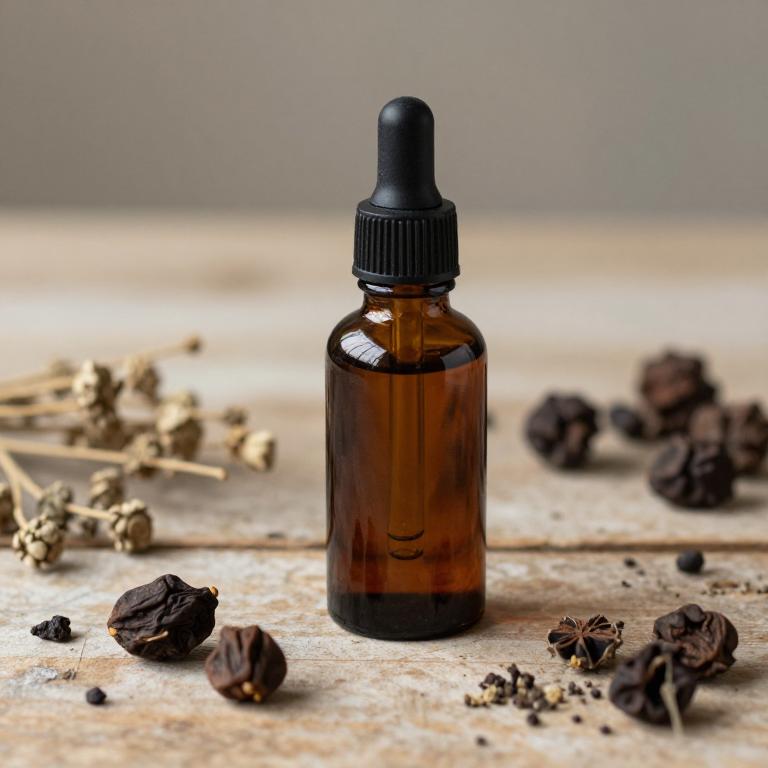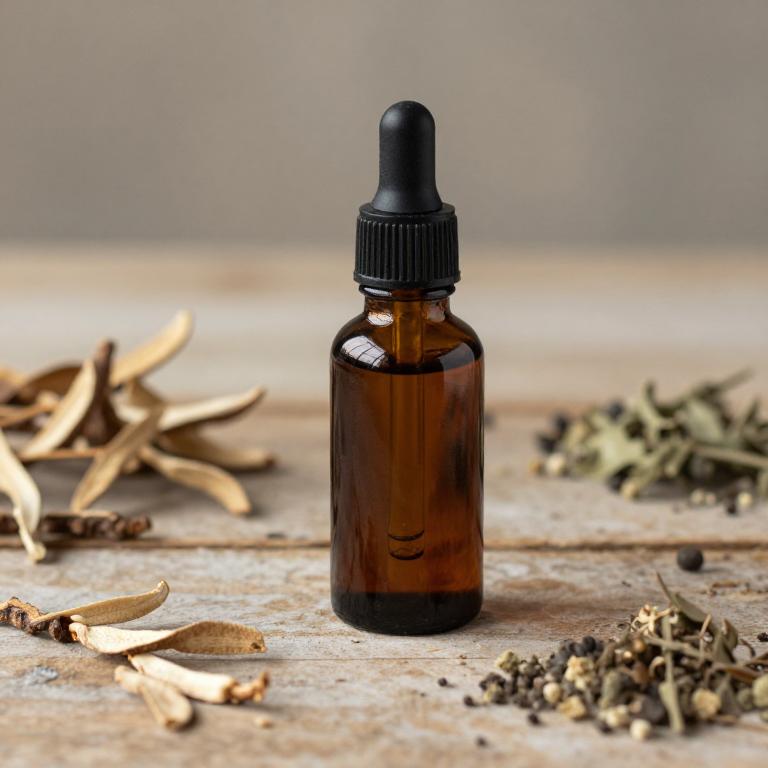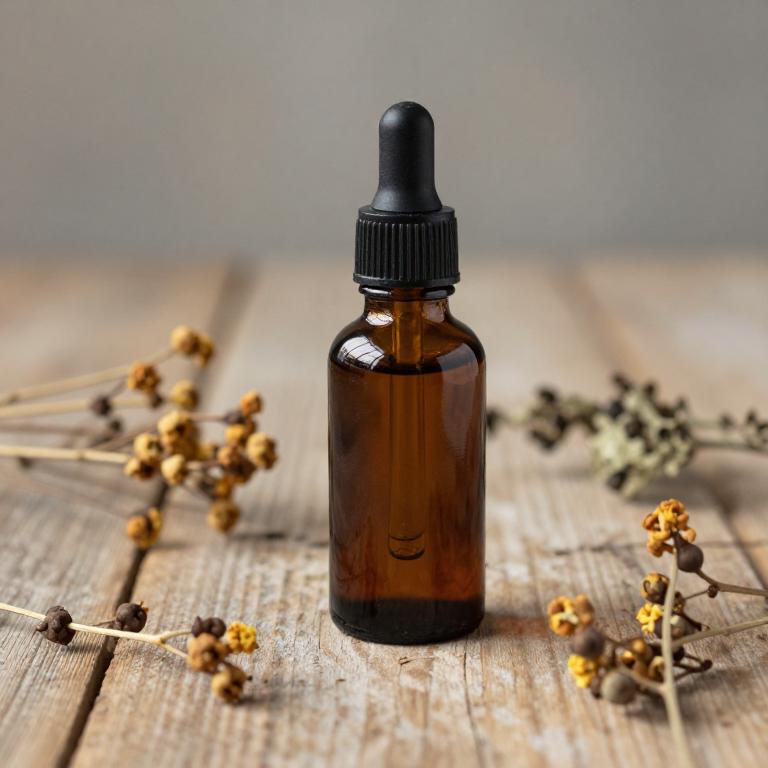10 Best Herbal Tinctures For Hyperacidity

Herbal tinctures offer a natural alternative for managing hyperacidity by leveraging the soothing properties of various plants.
Commonly used herbs include licorice root, ginger, and marshmallow root, which help to neutralize excess stomach acid and protect the lining of the stomach. These tinctures work by either reducing acid production, enhancing mucosal protection, or promoting digestion. They are often preferred for their mild side effect profile compared to synthetic antacids.
When used consistently and under the guidance of a healthcare provider, herbal tinctures can be an effective part of a holistic approach to treating hyperacidity.
Table of Contents
- 1. Licorice (Glycyrrhiza glabra)
- 2. Cumin (Cuminum cyminum)
- 3. Ginger (Zingiber officinale)
- 4. Black pepper (Piper nigrum)
- 5. Ashwagandha (Withania somnifera)
- 6. Fennel (Foeniculum vulgare)
- 7. Peppermint (Mentha piperita)
- 8. Thistle (Silybum marianum)
- 9. Marshmallow (Althaea officinalis)
- 10. Stinging nettle (Urtica dioica)
1. Licorice (Glycyrrhiza glabra)

Glycyrrhiza glabra, commonly known as licorice root, is widely used in herbal medicine for its soothing effects on the gastrointestinal tract.
Herbal tinctures made from Glycyrrhiza glabra are often employed to alleviate symptoms of hyperacidity, such as heartburn and indigestion, due to their anti-inflammatory and demulcent properties. These tinctures can help neutralize excess stomach acid and protect the mucosal lining of the stomach and esophagus. However, prolonged use of licorice tinctures may lead to side effects like hypertension and sodium retention, so it is important to use them under the guidance of a qualified herbalist or healthcare provider.
Overall, Glycyrrhiza glabra tinctures offer a natural alternative for managing hyperacidity, though they should be used with caution.
2. Cumin (Cuminum cyminum)

Cuminum cyminum, commonly known as cumin, is often used in herbal tinctures to help manage hyperacidity due to its anti-inflammatory and carminative properties.
The tincture is prepared by soaking the dried seeds in alcohol, allowing the active compounds to be extracted for therapeutic use. It is believed to support digestion by reducing excessive stomach acid and soothing the gastrointestinal tract. Regular use of cumin tinctures may alleviate symptoms such as heartburn and indigestion.
However, it is advisable to consult a healthcare professional before incorporating it into a treatment regimen, especially for individuals with existing health conditions or those taking other medications.
3. Ginger (Zingiber officinale)

Zingiber officinale, commonly known as ginger, is widely used in herbal tinctures to alleviate symptoms of hyperacidity due to its natural anti-inflammatory and antispasmodic properties.
These tinctures work by soothing the stomach lining and reducing excessive gastric acid secretion, which helps relieve discomfort such as heartburn and indigestion. The active compounds in ginger, including gingerol and shogaol, contribute to its effectiveness in neutralizing stomach acid and promoting digestive health. When taken in appropriate dosages, ginger tinctures can be a safe and natural alternative for managing hyperacidity without the side effects often associated with conventional medications.
However, it is advisable to consult a healthcare professional before using ginger tinctures, especially for individuals with existing medical conditions or those taking other medications.
4. Black pepper (Piper nigrum)

Piper nigrum, commonly known as black pepper, is a traditional herbal remedy that has been used for centuries to address various digestive issues, including hyperacidity.
The essential oils and alkaloids present in black pepper, such as piperine, are believed to stimulate digestion and reduce excess stomach acid production. Piper nigrum tinctures are often prepared by soaking the dried berries in alcohol to extract their active compounds, making them easily absorbable by the body. These tinctures are typically used in small doses to alleviate symptoms like heartburn and indigestion associated with hyperacidity.
However, individuals with sensitive stomachs should consult a healthcare professional before using piper nigrum tinctures, as they may cause irritation in some cases.
5. Ashwagandha (Withania somnifera)

Withania somnifera, commonly known as ashwagandha, is an adaptogenic herb traditionally used in Ayurvedic medicine to support overall health and balance.
Herbal tinctures made from Withania somnifera are often used to manage hyperacidity due to their potential to reduce stress and regulate the body's inflammatory response. These tinctures may help soothe the digestive system by promoting a balanced gastric environment and reducing excessive stomach acid production. The active compounds in ashwagandha, such as withanolides, are believed to have anti-inflammatory and antioxidant properties that contribute to its efficacy.
However, it is important to consult a healthcare professional before using these tinctures, especially for individuals with pre-existing medical conditions or those taking other medications.
6. Fennel (Foeniculum vulgare)

Foeniculum vulgare, commonly known as fennel, has been traditionally used in herbal medicine to address digestive issues, including hyperacidity.
Fennel tinctures are prepared by extracting the essential oils and active compounds from the dried seeds of the plant, which contain compounds like anethole and limonene. These compounds are believed to have antispasmodic and carminative properties that can help reduce stomach discomfort and neutralize excess acid. When used as a tincture, fennel may support the healing of the gastrointestinal tract and promote a sense of calm in the digestive system.
However, it is important to consult with a healthcare provider before using fennel tinctures, especially for individuals with existing medical conditions or those taking medications.
7. Peppermint (Mentha piperita)

Mentha piperita, commonly known as peppermint, is widely used in herbal tinctures to alleviate symptoms of hyperacidity due to its soothing and antispasmodic properties.
The active compounds in peppermint, such as menthol and menthone, help relax the smooth muscles of the gastrointestinal tract, reducing discomfort and bloating associated with excess stomach acid. These tinctures are often recommended as a natural alternative to over-the-counter antacids and proton pump inhibitors, offering a gentler approach to managing acid reflux and heartburn. Regular use of peppermint tinctures may also improve digestion and reduce the frequency of acid-related discomfort.
However, individuals with severe hyperacidity or underlying digestive disorders should consult a healthcare professional before incorporating peppermint tinctures into their regimen.
8. Thistle (Silybum marianum)

Silybum marianum, commonly known as milk thistle, is a herbal remedy that has been traditionally used to support liver function and may offer benefits for individuals experiencing hyperacidity.
While primarily recognized for its hepatoprotective properties, some studies suggest that its active compound, silymarin, may have anti-inflammatory and antioxidant effects that could help alleviate symptoms of excess stomach acid. Herbal tinctures made from Silybum marianum are often taken orally and may be used as a complementary therapy alongside conventional treatments for hyperacidity. However, it is important to consult with a healthcare professional before using these tinctures, as they may interact with certain medications or have contraindications for specific health conditions.
Overall, Silybum marianum tinctures show potential as a natural support for managing hyperacidity, though more research is needed to fully understand their efficacy and safety.
9. Marshmallow (Althaea officinalis)

Althaea officinalis, commonly known as marshmallow root, has been traditionally used in herbal medicine for its soothing properties, and its tinctures are often employed to address hyperacidity.
The plant contains mucilage, a gel-like substance that coats the mucous membranes, helping to neutralize excess stomach acid and reduce irritation. When used as a tincture, Althaea officinalis can provide a calming effect on the digestive tract, making it a popular remedy for heartburn and indigestion. It is typically prepared by soaking the dried root in alcohol, allowing the active compounds to be extracted for easier absorption.
While generally considered safe, it is advisable to consult a healthcare professional before using it, especially if you are on medication or have underlying health conditions.
10. Stinging nettle (Urtica dioica)

Urtica dioica, commonly known as stinging nettle, is a plant that has been traditionally used in herbal medicine for its various health benefits, including its potential to alleviate symptoms of hyperacidity.
When prepared as a tincture, Urtica dioica can help neutralize excess stomach acid due to its high mineral content, such as calcium, magnesium, and potassium. The tincture is typically made by soaking the dried leaves in alcohol, allowing the active compounds to be extracted for medicinal use. It is often recommended as a natural remedy for digestive discomfort, particularly in cases of heartburn and indigestion.
However, it is important to consult with a healthcare professional before using Urtica dioica tinctures, especially for individuals with existing health conditions or those taking medications.